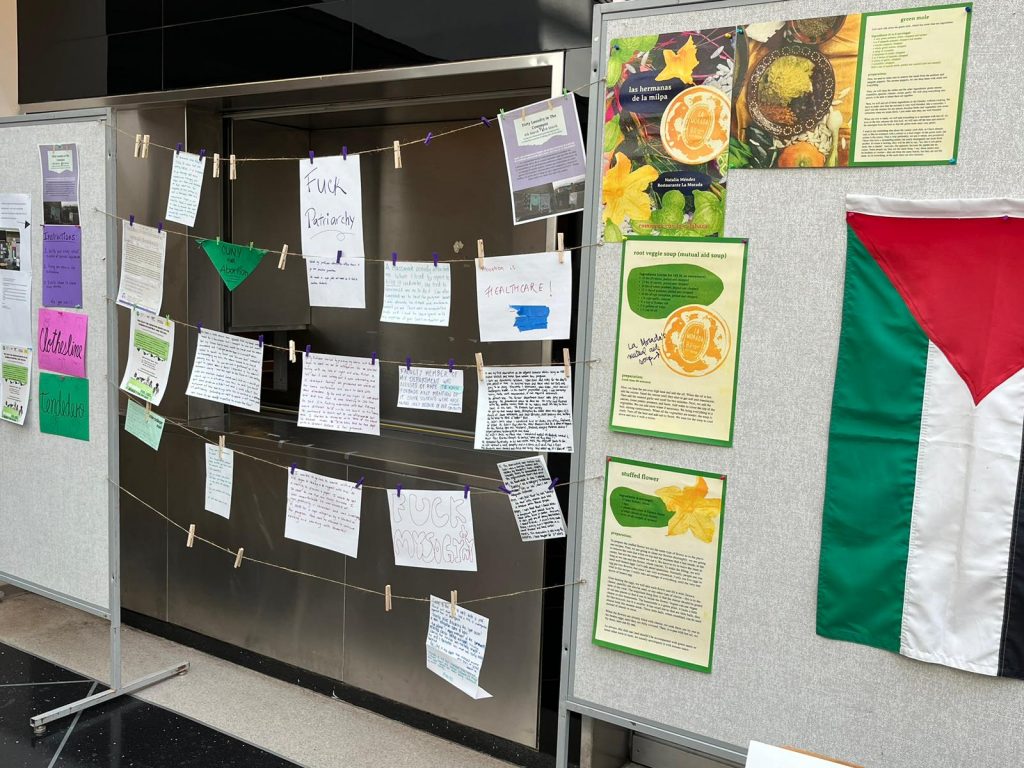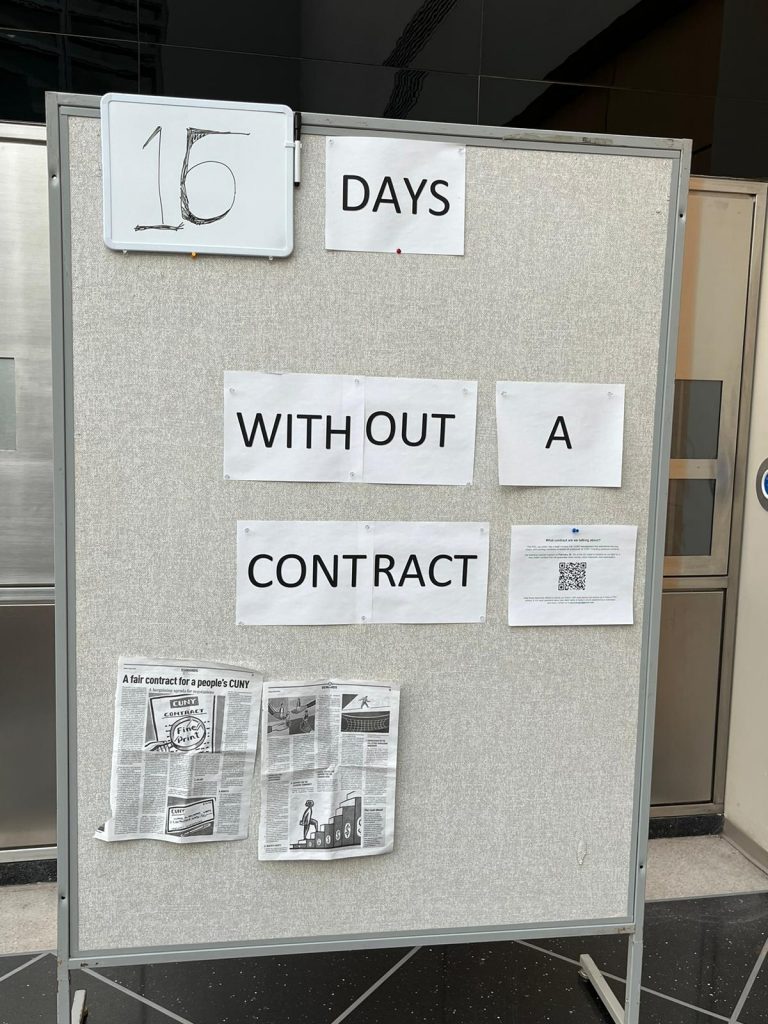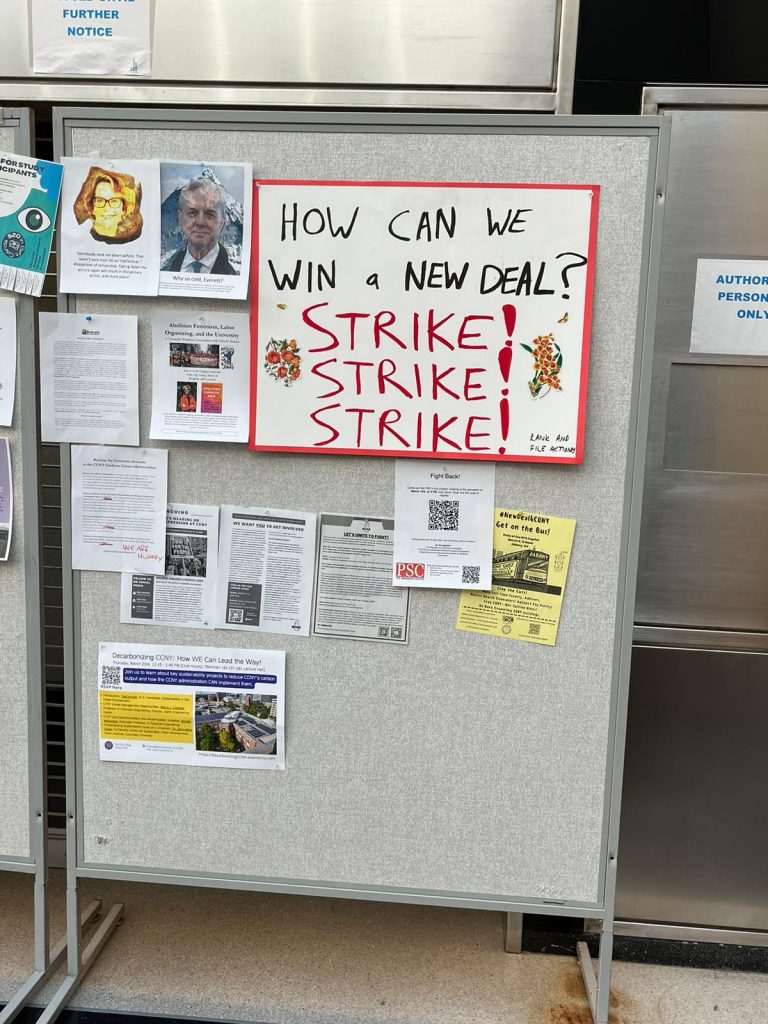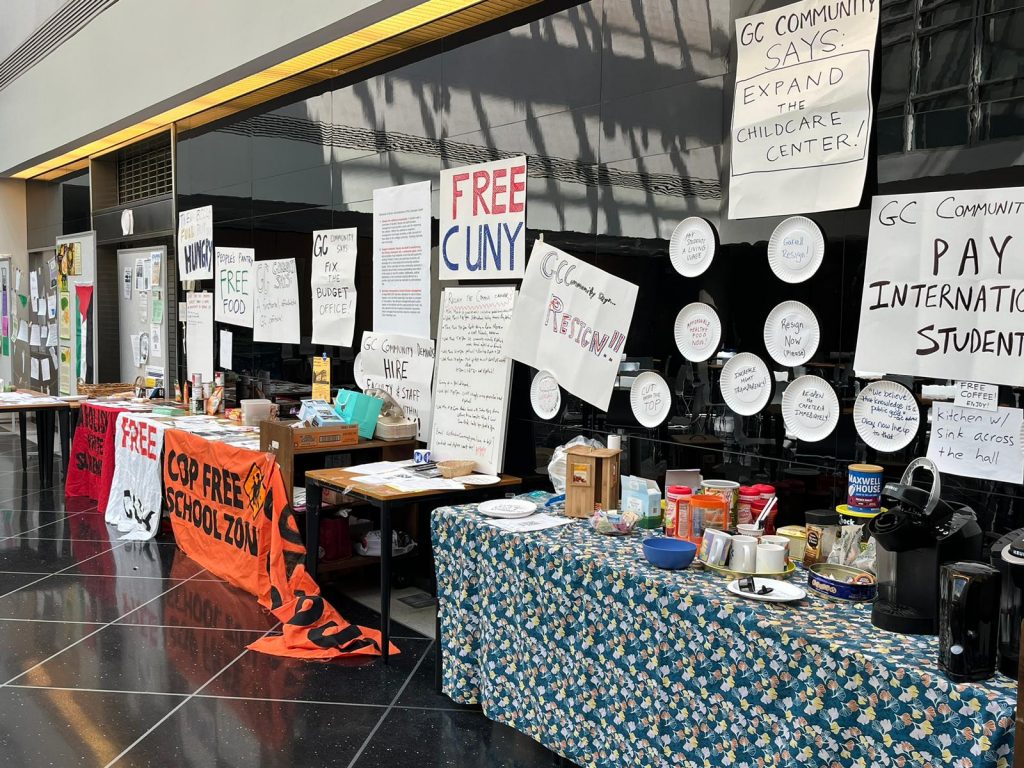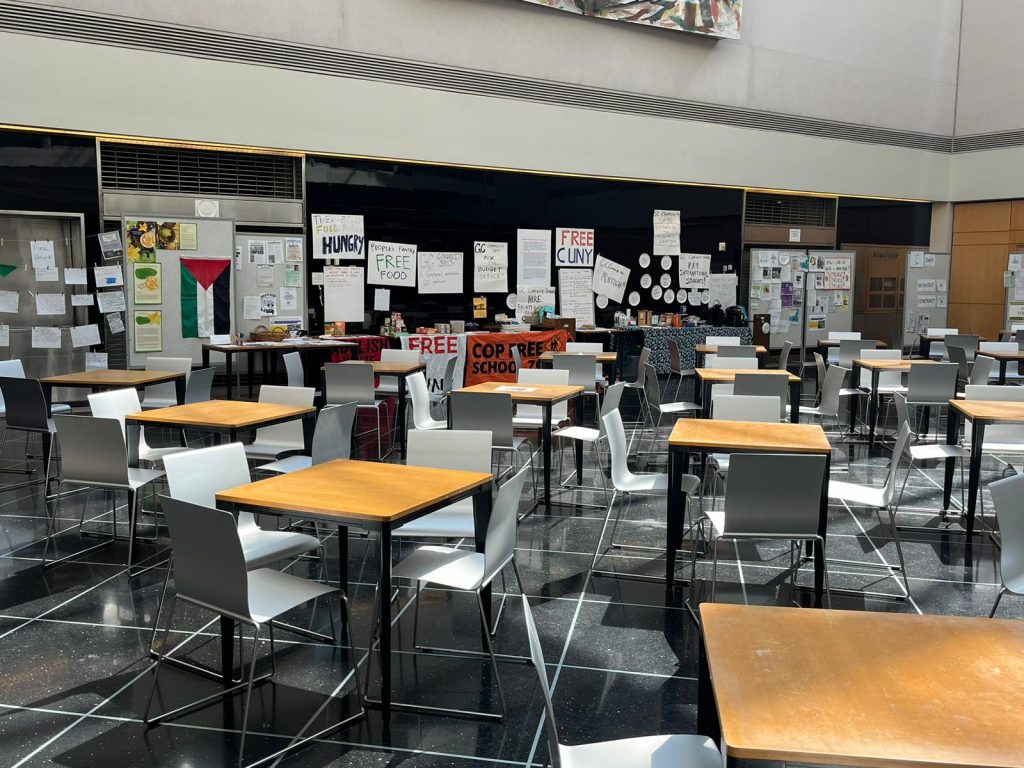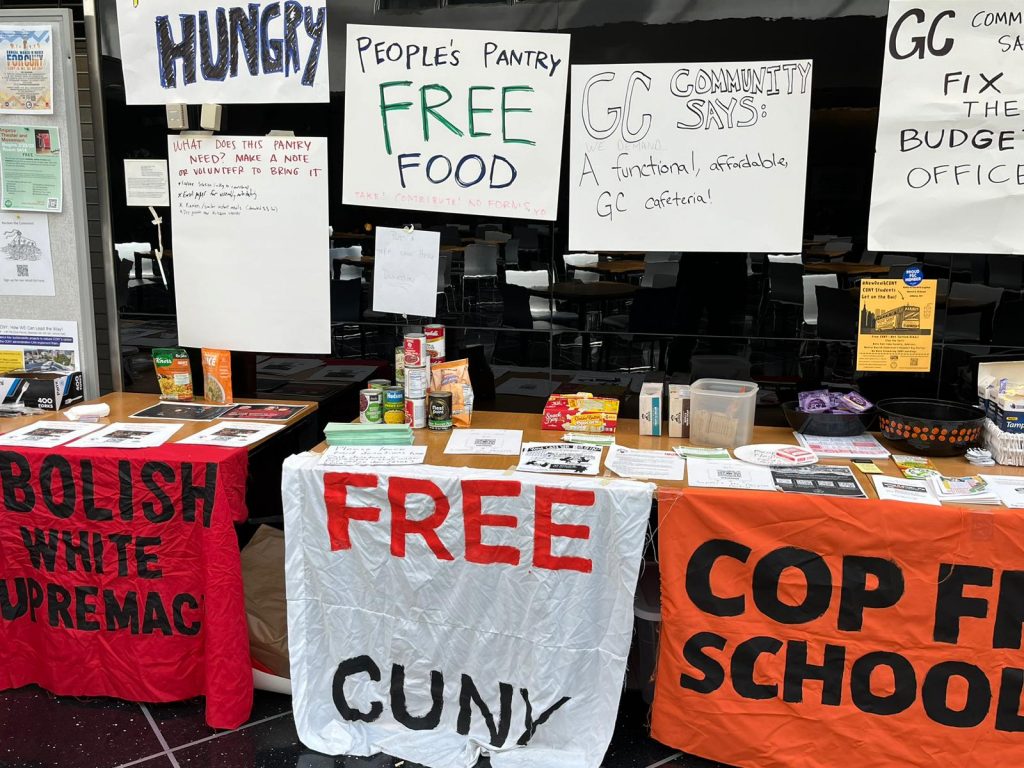Three years ago this month, the City University of New York (CUNY) pivoted to remote operations during the first wave of the coronavirus pandemic. When the university began to gradually reopen in-person operations after vaccines were widely available, dining services on many campuses — which students rely on for affordable meals — remained closed. At the same time, wages have not kept up with inflation, and budget cuts from the city and the state are gutting many of CUNY’s other services. Not only are affordable campus dining options important, but students and workers are struggling more than ever to afford basic needs.
At the CUNY Graduate Center, a team of students and workers operating as “Reclaim the Commons” is working to force CUNY to reopen dining services in their eighth floor dining commons space. It’s a collaboration between student government representatives; elected delegates from the Graduate Center chapter of PSC-CUNY (the faculty, staff, and graduate assistant union); rank and file union members, many of whom organize with the group Rank and File Action; and students without work assignments. The first step has been to organize “The People’s Pantry,” a food pantry and coffee station operating out of the dining commons. The People’s Pantry has so far raised thousands of dollars from members of the community and hosts weekly hot meals on Wednesday nights.
The Pantry is just one step in a campaign to restore dining services, transfer the responsibility of funding the food pantry to the university, assert community control over the space, demand transparency around the missing $900,000 in funds allocated in 2021 for kitchen repairs, and protect the right to political expression in the dining commons space. Universities prefer to keep radical ideas confined to the classroom — a politicized space puts these ideas into practice in direct confrontation with the bosses.
What began as two tables with some food on top has since expanded to a collective organizing space. Above the food tables (which now also include hygiene and safe sex supplies, plus a shelf of free books), there are signs with demands: Free CUNY, fix the budget office, pay international students, expand the childcare center, admins resign now! On bulletin boards flanking the tables, there is a whiteboard counting how many days since the expiration of the PSC-CUNY union contract, a big “STRIKE! STRIKE! STRIKE!” sign, a Palestinian flag, and a clothesline full of anonymous stories of sexual harassment and other experiences of misogyny at CUNY. Another table includes blank union cards ready for signing.
One bulletin board also has a “The Management Wall of Shame,” which includes printouts of emails sent from management to Reclaim the Commons activists in which they try to shut down the Pantry, reach out to PSC central leadership to go over the heads of chapter activists, and limit the number of union members who would be allowed to attend the most recent labor-management meeting.
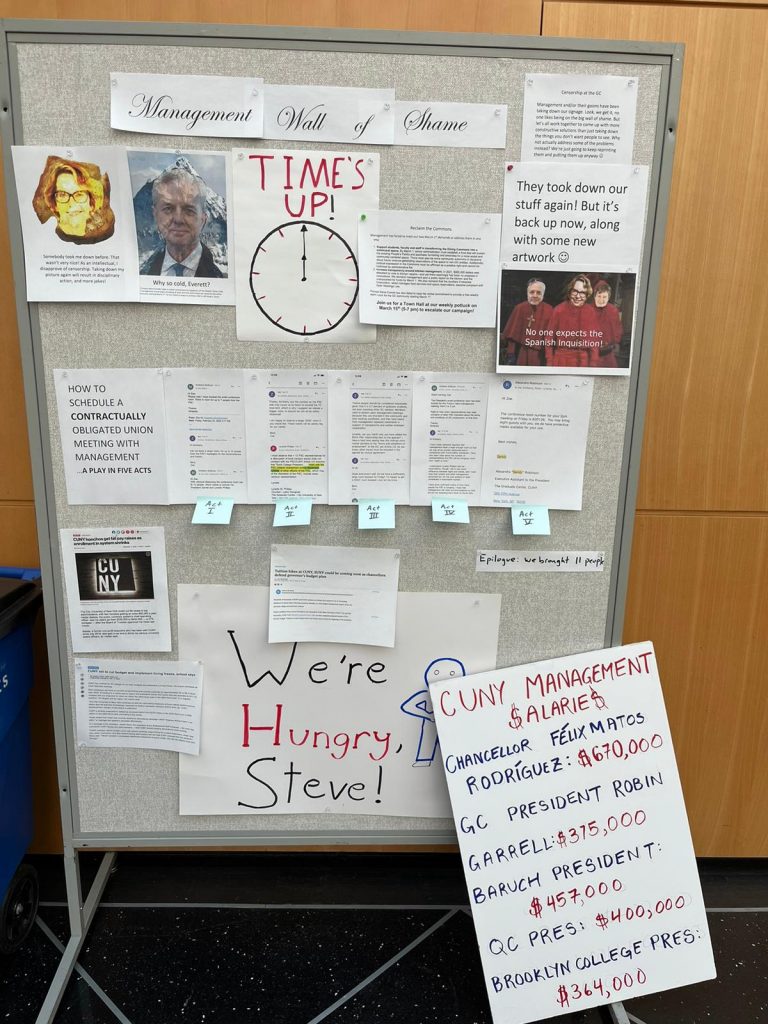
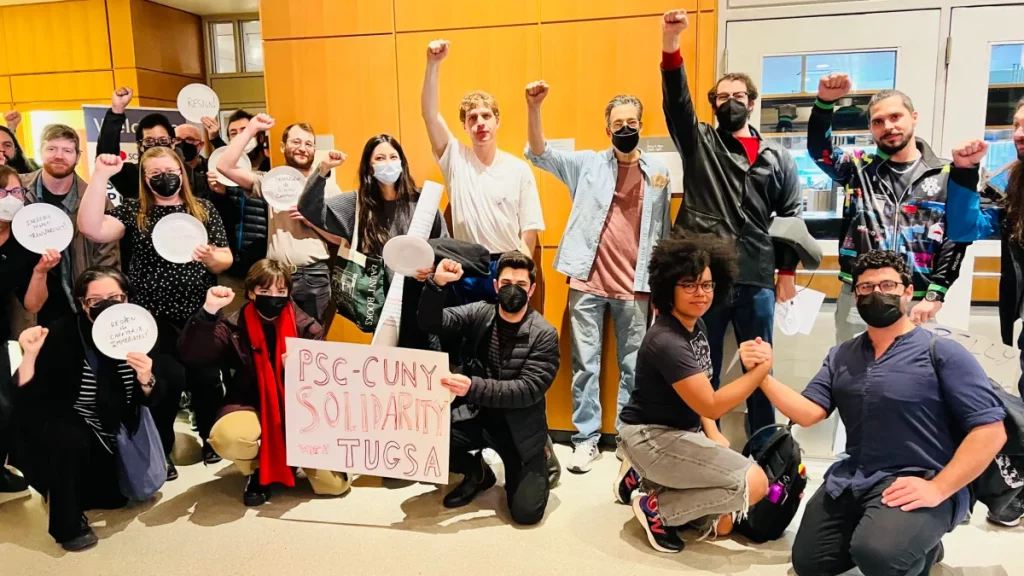
On February 15, the Graduate Center’s President, Robin Garrell, held a “community meeting.” Pantry activists wrote slogans on paper plates and held them up during the meeting, after taking a solidarity photo for the striking TUGSA workers. After this meeting, administrators attended the potluck at the pantry and made a small contribution, promising to begin funding weekly lunches in the dining commons. This promise never materialized.
One weekend in February, the administration tried to force the People’s Pantry to temporarily relocate while the music department held auditions in the dining commons. The Reclaim the Commons team refused. Management then put up temporary barriers blocking the view of the pantry and its political messages, as well as blocking access to the supplies for anyone who needed food or beverages over the weekend.
On March 15, the administration tried to stifle the pantry’s political speech again, announcing that the dining commons would be “closed” for several hours while facilities staff “set up” for the Graduate Council meeting scheduled to take place in the space. Reclaim the Commons activists refused to leave, holding the space and recruiting other students and workers to join them. The administration backed down, didn’t force them to leave, and instead canceled the meeting only two hours before it was scheduled to begin due to “space limitations.” It was obvious from the start that this was a lie — the meeting had been booked for months, the room is plenty big enough for the Grad Council, and one of the auditoriums was in fact also available. It seems likely that this was a ploy to avoid the prospect of a new No Confidence vote on the senior administration, after the previous No Confidence vote was invalidated by the administration on technicalities about quorum.
Graduate Council members decided to still meet and then joined Reclaim the Commons activists in paying a visit to President Garrell’s office, where a security guard was posted. Garrell shared that the “real” reason the meeting was canceled was at the CUNY legal department’s advice due to threats of potential “disruption.” As neither the Graduate Council reps, nor the student government reps, nor the union chapter, nor Rank and File Action activists, had planned any disruptions outside of bringing up issues within the normal functioning of the meeting, this seemed to also be a lie.
Graduate Center PSC chapter president Zoe Hu, a graduate student worker, pointed out that blaming the cancellation on hypothetical student activism is an attempt to divide students from faculty when in reality, many faculty and staff are involved in running the pantry as well, and the Graduate Council includes student representatives from each academic department. According to the union’s summary of the meeting, Professor and renowned prison abolitionist Ruth Wilson Gilmore “added to what Hu had said, and summarized that the traditions of CUNY are to disrupt meetings, [and] characterized the whole approach of how the administration was treating the GC as criminalizing.”
President Garrell expressed confusion at this term, accused activists of not respecting her integrity, protested that she is working hard and it’s difficult to balance a budget, and made the ridiculous statement that “none of you have lived through a pandemic.”
In the past, the student government has successfully submitted requests from chartered student organizations to use student government funds for catering Wednesday night dinners in the reclaimed commons space. These requests, for money already allocated to the Doctoral and Graduate Students Council and nominally under its control, must still be approved by Brian Peterson, the Senior Vice President for Administration and Finance. In the days since that meeting with President Garrell, student government reps noticed that their requests for room reservations and release of funds are no longer being approved. For the time being, it’s unclear whether this is deliberate repression or a coincidental administrative backlog, a natural consequence of requiring a single administrator’s sign off on every financial decision at the school.
In another meeting requested by the administration with student government representatives and Reclaim the Commons activists this past week, management revealed that it is discussing how to open a separate, bureaucratically organized food pantry, with restricted visiting hours, hidden away from the university community, and perhaps requiring sign-in sheets and other documentation. This is a direct rejection of the coalition’s demand for the administration to fund the People’s Pantry and, more importantly, an attempt to wrest political control of the space away from students and workers. Management knows the space isn’t just about providing food — it’s an organizing space, a union space, a space dedicated to fighting the bosses, from campus administrators all the way up to the governor. The politicized space evokes the possibilities of a university under student and worker control, and directly confronts and shames the bosses in a space that the university sometimes rents out to other organizations.
The People’s Pantry organizers are demanding community control of the space — of course management would never voluntarily consent to funding a space dedicated to organizing against itself. But this is exactly the point — the establishment of the food pantry has always been just one step in the bigger campaign, designed to provide a much-needed service while directly clashing with the administration in a fight for much bigger changes in the workplace. It’s precisely the function as a political space that makes it so valuable to students and workers, and so dangerous to the administration.
Upcoming events in the commons include a panel on abortion rights activism in the Dominican Republic, LGBTQ+ Night at the People’s Pantry, and a cross-campus organizing dinner to discuss mobilizing PSC members around the union’s next contract.
